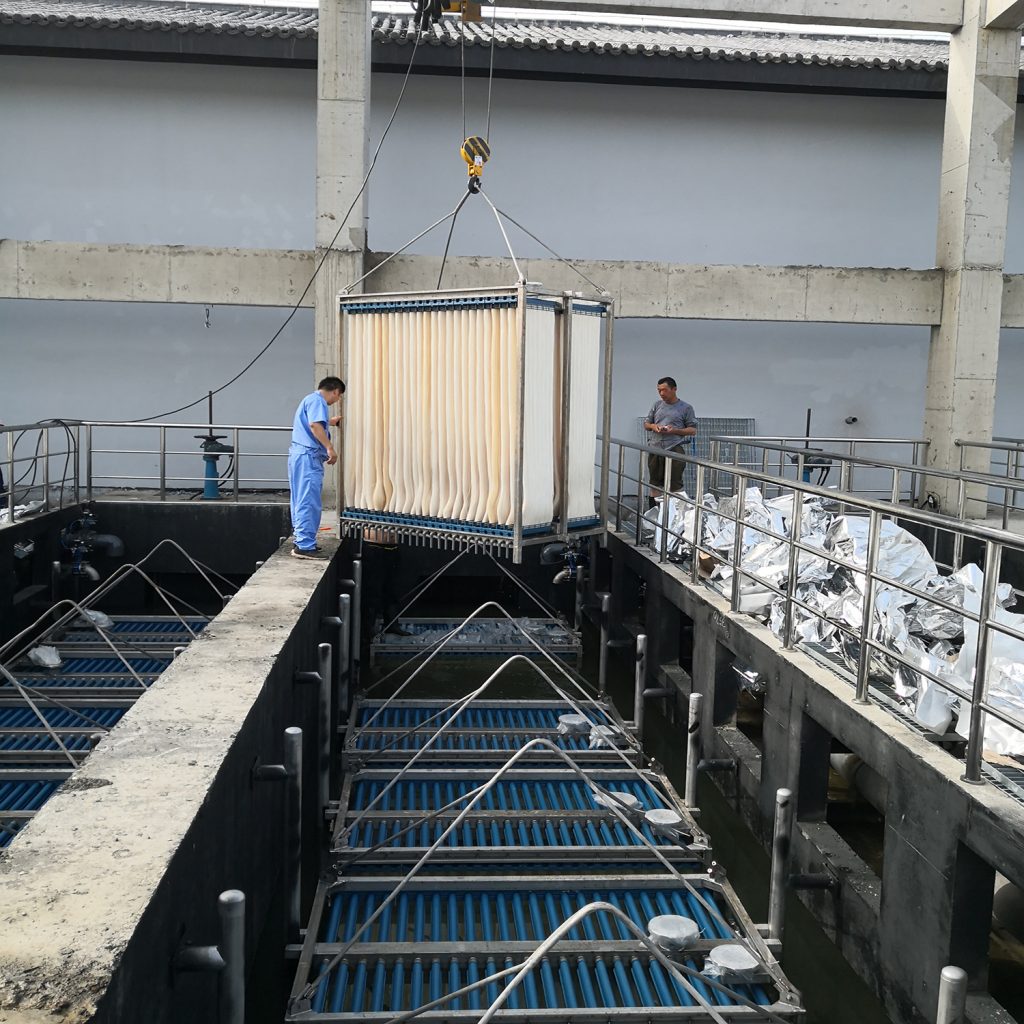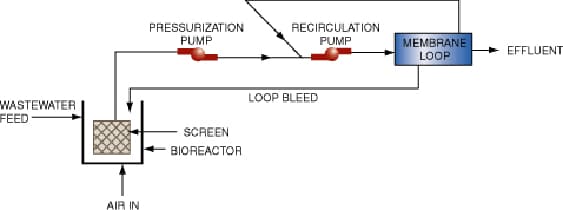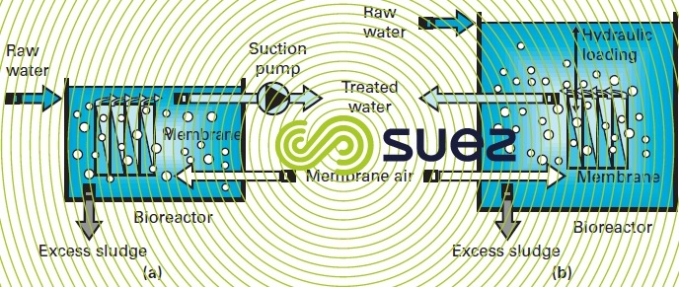Why Membrane Bioreactor Solutions Are Ideal for Sustainable Water Treatment
Why Membrane Bioreactor Solutions Are Ideal for Sustainable Water Treatment
Blog Article
How Membrane Bioreactors Are Changing Water Purification Equipments
The introduction of membrane layer bioreactors (MBRs) represents a considerable improvement in the field of water purification, merging biological treatment processes with cutting-edge membrane layer purification modern technologies. As international water shortage heightens, the function of MBRs in assisting in drinkable water reuse and sustainable water management comes to be significantly essential.
Review of Membrane Layer Bioreactors
Membrane bioreactors (MBRs) represent a substantial innovation in water filtration technology, as they combine organic treatment processes with membrane layer filtration. This integration boosts the effectiveness of wastewater treatment by utilizing microbes to break down organic pollutants while all at once utilizing semi-permeable membranes to different cured water from suspended microorganisms and solids.
The MBR system usually includes an organic reactor where the microbial populace metabolizes pollutants, followed by a membrane layer filtration device that keeps biomass and allows just clean water to go through. This dual capability results in greater effluent quality contrasted to conventional therapy methods. MBRs can be run in both batch and constant circulation settings, using flexibility in style and application.
Additionally, MBRs are defined by their portable footprint, making them ideal for urban settings with room constraints. Membrane Bioreactor. They additionally enable the healing of water for reuse, hence contributing to water sustainability efforts. While MBR technology has obtained popularity in industrial and metropolitan applications, its operational intricacies and power needs require mindful consideration during application. On the whole, MBRs go to the center of improving water therapy performance and quality, showcasing the capacity for ingenious remedies in environmental management.
Benefits of MBR Innovation
The integration of biological treatment with membrane layer purification offers various advantages for water filtration procedures. Among the key advantages of Membrane layer Bioreactor (MBR) technology is its ability to efficiently remove both organic and inorganic impurities, bring about high-quality effluent. The membranes act as a physical obstacle, protecting against put on hold solids and microorganisms from going through, which improves the overall safety and reliability of cured water.
Furthermore, MBR systems need a smaller impact contrasted to traditional treatment methods, enabling extra effective area usage. This portable style is particularly advantageous in city settings where land is limited. MBRs additionally demonstrate operational adaptability, fitting varying influent top qualities and flow prices without considerable performance destruction.
Moreover, the process supplies improved nutrient removal capacities, especially for nitrogen and phosphorus, which are critical for protecting against eutrophication in getting waters. The reduced sludge manufacturing related to MBR modern technology likewise converts to reduce disposal prices, making it an economical service over time - Membrane Bioreactor. In general, the benefits of MBR technology setting it as a leading choice for ingenious and lasting water purification systems, attending to both ecological and economic problems
Applications in Water Purification
Applications of Membrane Bioreactor (MBR) modern technology in water purification are varied and impactful, dealing with different therapy needs across numerous sectors. MBRs successfully integrate organic treatment processes with membrane layer filtration, making them excellent for community wastewater treatment, commercial effluent monitoring, and even drinkable water reuse campaigns.
In local setups, MBRs are significantly used to boost the top quality of dealt with wastewater, enabling compliance with stringent discharge regulations and facilitating the recycling of water for irrigation and non-potable uses. Their compact design also makes them suitable for urban environments where space is restricted.
Industrially, MBR modern technology is made use of to deal with procedure water and wastewater, especially in markets such as food and beverage, pharmaceuticals, and textiles. By effectively removing contaminants and put on hold solids, MBRs help industries decrease ecological impacts while recovering valuable sources from wastewater streams.
In Addition, MBRs are getting traction in decentralized water treatment applications, where small systems can be released in remote areas or developing areas. This flexibility allows communities to achieve lasting water administration services, boosting accessibility to clean water while reducing dependence on standard treatment approaches.
Situation Studies and Success Stories

In another instance, a textile production facility in Bangladesh took on MBR technology to resolve its wastewater challenges. The system decreased chemical oxygen need (COD) levels from 1,200 mg/L to less than 100 mg/L, therefore meeting regulative criteria and dramatically lessening ecological effect.
The College of Cape Town's MBR installment has verified effective in treating greywater for non-potable reuse on university. next This project not just preserves drinkable water yet also offers as an instructional design for lasting practices.
Additionally, a fish and shellfish processing plant in Norway utilized MBR modern technology to deal with effluents including high degrees of natural matter, accomplishing over 90% toxin elimination. These case research studies emphasize MBR technology's flexibility and its essential role in enhancing water high quality throughout varied applications.
Future of Water Therapy Solutions
As global water scarcity and contamination challenges magnify, ingenious water therapy remedies are coming to be increasingly important to make sure lasting accessibility to tidy water. The future of water therapy hinges on the assimilation of innovative technologies that enhance the efficiency and effectiveness of purification processes. Membrane bioreactors (MBRs) are at the forefront of this evolution, combining biological treatment with membrane filtration to produce top quality effluent appropriate for different applications.

Arising patterns such as resource recuperation from wastewater, consisting of nutrients and power, will further change therapy facilities into eco-friendly centers. Developments in nanotechnology and membrane products guarantee improved efficiency and durability of filtration systems.

Final Thought
Their function in safe and clean water reuse and lasting water management highlights their value in addressing global water shortage obstacles. Continued research and advancement will certainly further enhance the effectiveness and fostering of MBR modern technology, ensuring a durable future for water therapy remedies.
The emergence of membrane bioreactors (MBRs) represents a considerable improvement in the area of water filtration, combining organic therapy processes with cutting-edge membrane filtering innovations. As worldwide water shortage escalates, the role of MBRs in helping with drinkable water reuse and sustainable water administration ends up being significantly essential. They additionally make it possible for the recuperation of water for reuse, hence adding to water sustainability campaigns.As international water deficiency and contamination difficulties increase, ingenious water treatment services are becoming increasingly important to ensure lasting accessibility to tidy water. Their click for source function in potable water reuse and sustainable water monitoring highlights their relevance in attending to worldwide water scarcity challenges.
Report this page